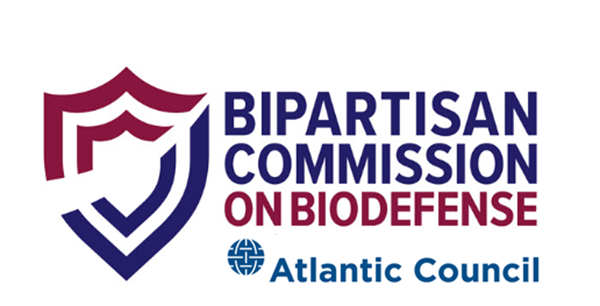America’s Ability to Manage Biological Crises Improves with Release of National Biodefense Strategy

FOR IMMEDIATE RELEASE
Contact: Steve Aaron
SRA Communications
(717) 554-8614
steve@SRACommunications.com
AMERICA’S ABILITY TO MANAGE BIOLOGICAL CRISES IMPROVES WITH RELEASE
OF NATIONAL BIODEFENSE STRATEGY
Bipartisan Commission on Biodefense Applauds National Strategy Which Reflects Many of the Commission’s Own Priorities; Calls on Congress to Work with White House on Implementation
WASHINGTON, D.C. (Oct. 21, 2022) – The Bipartisan Commission on Biodefense today applauded the Biden Administration for its comprehensive National Biodefense Strategy and Implementation Plan (NBS) released this week and urged Congress to work in partnership with the Administration to put into effect the measures necessary to defend the Nation. The NBS is designed to be a comprehensive approach to protecting our Nation in the future from pandemics and other biological threats, including bioterror attacks perpetrated by nation-states, terrorist groups, or lone wolf attackers. Commission Co-Chair and former Senator Joe Lieberman says the new strategy is a much-improved version of the original strategy issued in 2018 and expressed his hope that interagency support in developing it will provide greater opportunities for successful implementation.
“This much-anticipated national biodefense strategy is a critical step forward in providing biological security to the American people. It aligns the roles and responsibilities of our federal government in biodefense from prevention to recovery, and also sets an ambitious agenda for deploying technologies that can eliminate the threat of pandemics within 10 years,” said Sen. Lieberman. “This can and must be done so that our nation does not have to relive the nightmares of COVID-19 and other biological events in both lives lost and economic suffering.
“We also are encouraged that, learning from the public trust challenges of COVID, the new strategy lays out specific goals related to public communication which will be critical in helping all Americans become better educated on these problems and how they themselves can become part of the solution.”
Senator Lieberman expressed his appreciation to the Biden Administration for including in the National Biodefense Strategy and Implementation Plan 25 of the 33 recommendations made by the Commission in its 2015 report, A National Blueprint for Biodefense: Leadership and Major Reform Needed to Optimize Efforts. The Blueprint identified capability gaps and recommended changes to U.S. policy and law to strengthen national biodefense while optimizing resource investments. The new strategy also draws from many of the recommendations made in other Commission reports, including the Apollo Program for Biodefense and subsequent Athena Agenda report.
“While many of our recommendations are aligned with the new strategy, in some cases, only components of those recommendations are addressed which is somewhat concerning,” said Commission Co-Chair and first U.S. Secretary of Homeland Security Tom Ridge. “There is a lack of specificity when it comes to what or how technologies will be implemented. We are confident these omissions can be addressed and it does not take away from the important work that has been done on the overall strategy. We look forward to working with the Administration and Congress as they execute this new strategy in the months ahead. When we see the devastation caused by biological incidents there are few priorities more important for our nation today.”
About the Bipartisan Commission on Biodefense
The Bipartisan Commission on Biodefense was established in 2014 to conduct a comprehensive assessment of the state of U.S. biodefense efforts, and to issue recommendations to foster change. The Commission’s 2015 report, A National Blueprint for Biodefense: Leadership and Major Reform Needed to Optimize Efforts, identified capability gaps and recommended changes to U.S. policy and law to strengthen national biodefense while optimizing resource investments. In its 2021 report, Biodefense in Crisis: Immediate Action Needed to Address National Vulnerabilities, the Commission described the extent to which the federal government had implemented the Commission’s recommendations. Other Commission publications have addressed critical needs for agrodefense; land grant universities; biodefense budgeting; diagnostics; an Apollo Program for Biodefense; an Athena Agenda for implementing the Apollo Program; national biodetection; biodefense of critical infrastructure; and State, Local, Tribal and Territorial response capabilities. In September 2018, the White House released the National Biodefense Strategy, a top recommendation from the Blueprint and in September 2021 released the American Pandemic Preparedness plan, based on the Apollo Program report. The Commission continues to address biodefense challenges and to urge reform. Former Senator Joe Lieberman and former Governor Tom Ridge co-chair the Commission. Hudson Institute is the Commission’s fiscal sponsor.
